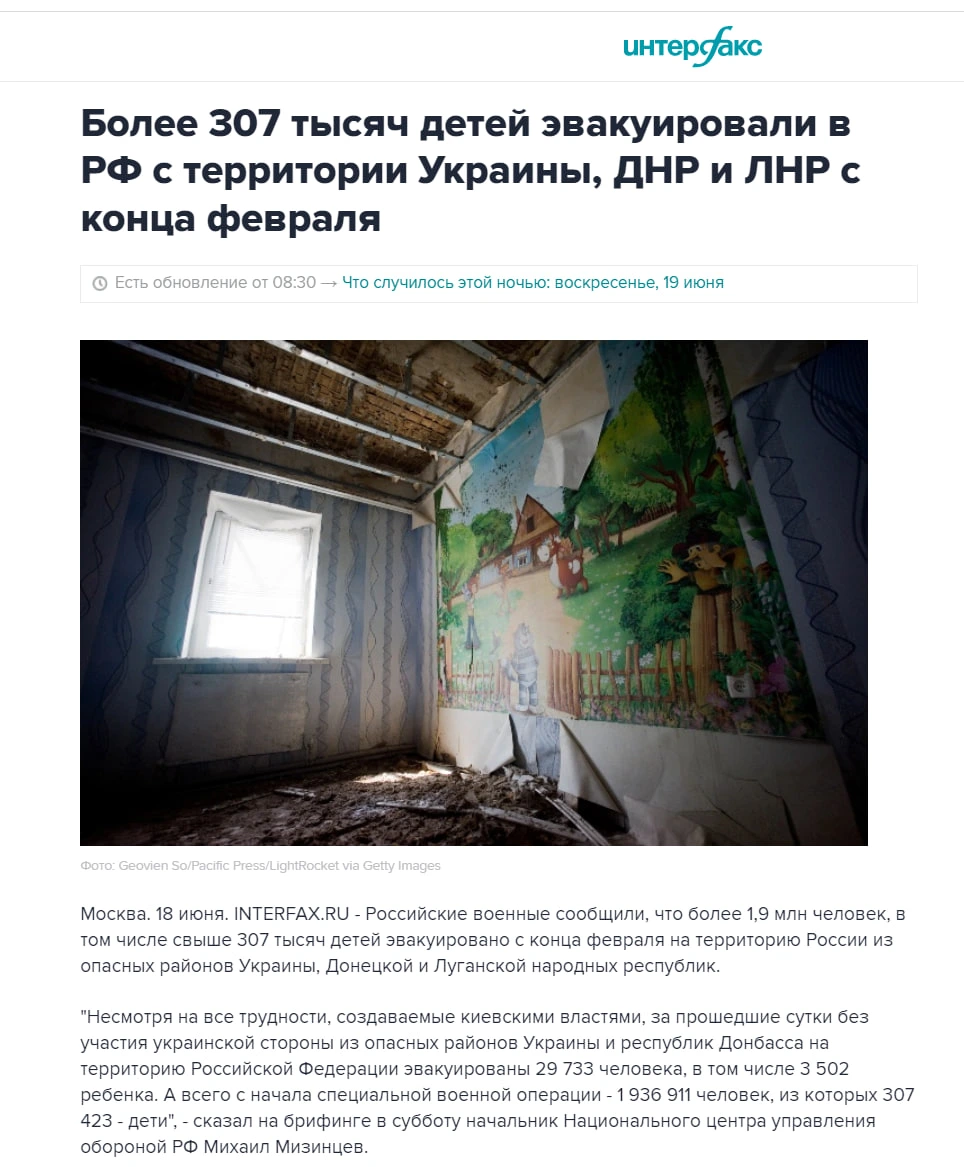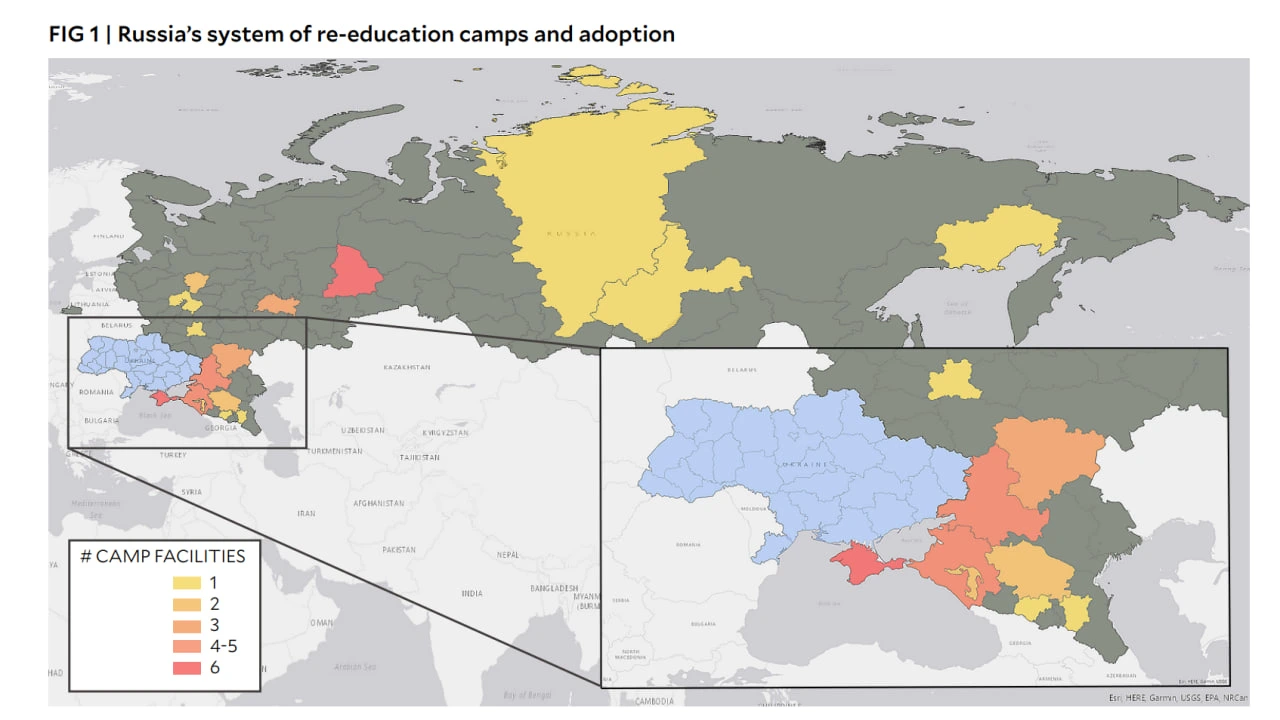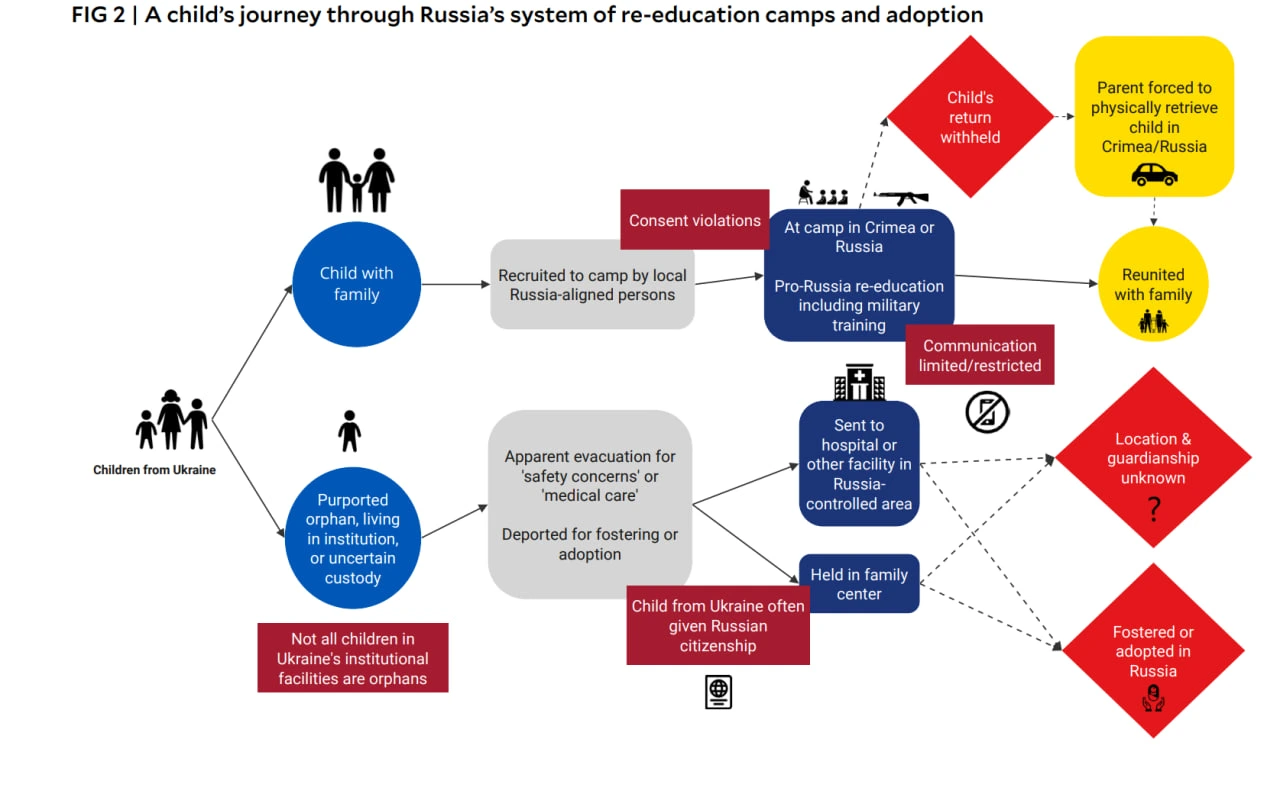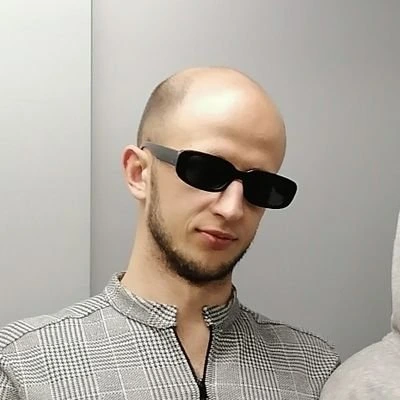International Criminal Court of Justice opens two war crimes cases against Russian Federation, NYT reports on, March 13, 2023. One of them concerns the deportation of Ukrainian children from occupied territories to Russia during the full-scale invasion.
A month ago, the Humanitarian Research Lab of the Yale School of Public Health presented a detailed report with the results of an investigation into violating the Convention on the Rights of the Child by the Russian Federation.
Officially: 14700 Ukrainian children have been deported by Russia, more than 1000 orphans are waiting for adoption, 350 have been returned to their parents, and only 126 children have returned to Ukraine.
And that’s only the documented cases, which can be just a tip of the real picture. Ukrainian officials claim even bigger numbers. Russia supports these claims with its own data in May:
“Over the past 24 hours, without the participation of the Ukrainian authorities, 16,480 people, including 3,354 children, have been evacuated from dangerous areas of Ukraine, the Donetsk and Luhansk People’s Republics on the territory of the Russian Federation, and a total of 1,002,429 people have been evacuated since the beginning of the special military operation, of which 183,168 children,"
said the head of the National Center of the Russian Federation.
Later in June, Mikhail Mizintsev, head of the National Defense Management Center, proclaimed 1,936,911 Ukrainians had been deported to Russia, of whom 307,423, are children as of June 2022.

So, in fact: several hundred thousand children have been forcibly relocated from russian-occupied territories since February 24, 2022.
According to the Fourth Geneva Convention, the transfer and deportation of protected persons, including kids, is an unlawful grave breach of the geneva convention on the protection of civilians and constitutes a war crime.
Also, russian actions violate the UN Convention on the Prevention and Punishment of the Crime of Genocide or the Genocide Convention of 1948 and Article 6 of the Rome Statute of the International Criminal Court, according to Ph.D. in Law and associate professor in the International Relations Department at Lviv University of Business and Law, Volodymyr Pylypenko.
But how are genocide and ethnicity erasing actually happening in the 21 century?
How can this technically happen?
The russian leadership, led by the Commissioner for Children’s Rights, Maria Lvova-Belova, and the Commissioner for Human Rights, Tatyana Moskalkova, has established a system of children’s camps to which Ukrainian children are sent. Putin personally gives instructions and receives reports on the work done.
Officials offer low-income families free placement of children in the camps for a month. The reason is simple and logical: to allow the children to recover, be protected from military operations, and be provided with proper sanitary conditions and food. In many cases, the ability of parents to fully consent to their children’s “recuperation” is questionable, given the coercive nature of wartime conditions and the hidden threat of occupation forces.
After the time expires, most children are not returned to their parents. Reports indicate a substantial lack of communication between parents and camp officials during delays.
Multiple parents whose children were delayed at one of the camps were not directly informed about it. Parents found out through phone conversations with their children, word of mouth, or local news outlets. After Ukraine liberated its region, a group of parents reached the camp officials only to be told that the camp would not be returning their kids.
When calling the camp director, one mother was allegedly told the children could not be returned. Reason - “There is war there.” There is a lack of explanation about Ukrainian children regarding the delay. An official at the Medvezhonok camp told a boy from Ukraine that his return depends on Russia’s re-capture of the town of Izyum. One kid was told he wouldn’t return home due to his “pro-Ukrainian views.”
There was a case when a mother sent her daughter to Medvezhonok because she has a chronic illness, wanting her daughter to rest. Once Medvezhonok’s officials stopped her daughter’s return, the mother got the phone number for the camp director through her daughter. The director told the mother that her daughter would not return to Ukraine.
Why does Russia detain Ukrainian kids?
The real purpose of these camps is to reeducate children from the newly occupied territories into a russian lifestyle, convert them to russian citizenship, and impose on them a version of russian history and culture. Russian authorities even provide military exercises for boys, sending them to Chechnya to fully integrate them into the society, which serves the political interests of the russian government. It makes Ukraine’s kids a tool of war for Russia with one goal: erasing Ukrainian identity, cultural memory, and future.
As the camp management prohibits children from speaking to their parents, they refuse to send children home under the guise of military operations and the “safety” of children. The only option is to pick up their child. You can see the shocking geography of deportation on the map below. Russia deports kids without warning to its remotest regions.

Parents may not know their child’s actual location. Only the mother can take the child with her, as men cannot leave Ukraine currently from the unoccupied territory. Moreover, it is necessary to spend a lot of money, cross several countries and possibly even cross the front line.

Can this become a successful legal case in ICC?
“Child abduction is considered one of the “six grave breaches of the rights of children in armed conflict” and is prohibited under international humanitarian law, international human rights law, customary international law, and numerous precedents of international courts. The forcible transfer of children from one group to another may constitute a violation of Article 2(e) of the 1948 Convention on the Prevention and Punishment of the Crime of Genocide. The Rome Statute also recognizes the forcible transfer of children as one of the constituent acts of the crime of genocide, which is a crime against humanity.” - the Yale report says.
The cases opened in ICC represent the first international charges to be brought forward since the start of the conflict and come after months of work by special investigation teams. Who the court planned to charge in each case is yet unclear. Requested to confirm the issue of arrest warrants, the prosecutor’s office responded,
“We do not publicly discuss specifics related to ongoing investigations.”
As for now, Karim Khan - the chief prosecutor, will initially present his charges to a panel of pretrial judges. Those will decide whether the legal standards were met for issuing arrest warrants or whether investigators need more evidence.
The Yale HRL research provides some information that can be used as proof. Yet it bases its work on open-source information and does not interview witnesses or victims. Also, many families in Ukraine want to keep their experiences private. They are afraid to become public and acknowledged as collaborators with Russia. Those living under russian occupation may also not report abuses because they fear reprisals from russian forces. Summary So, Russia has unleashed a full-scale war and thus created a danger for Ukrainian children. For almost a year and a half, Russia has been “saving” them and forcibly integrating them into their society. All participants in the deportation process - Putin, officials, and ordinary russian citizens - are deliberately violating children’s rights and international laws.
Source: Conflict Observatory



